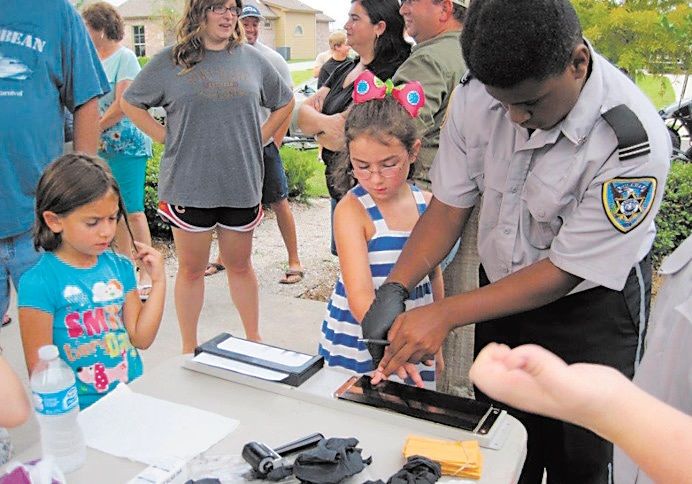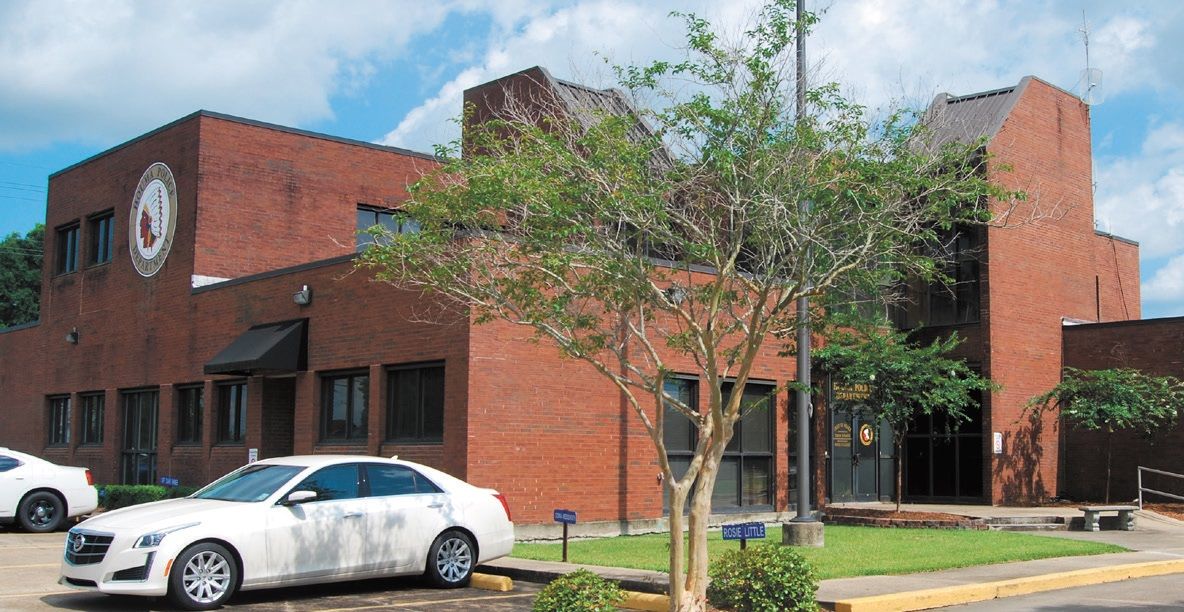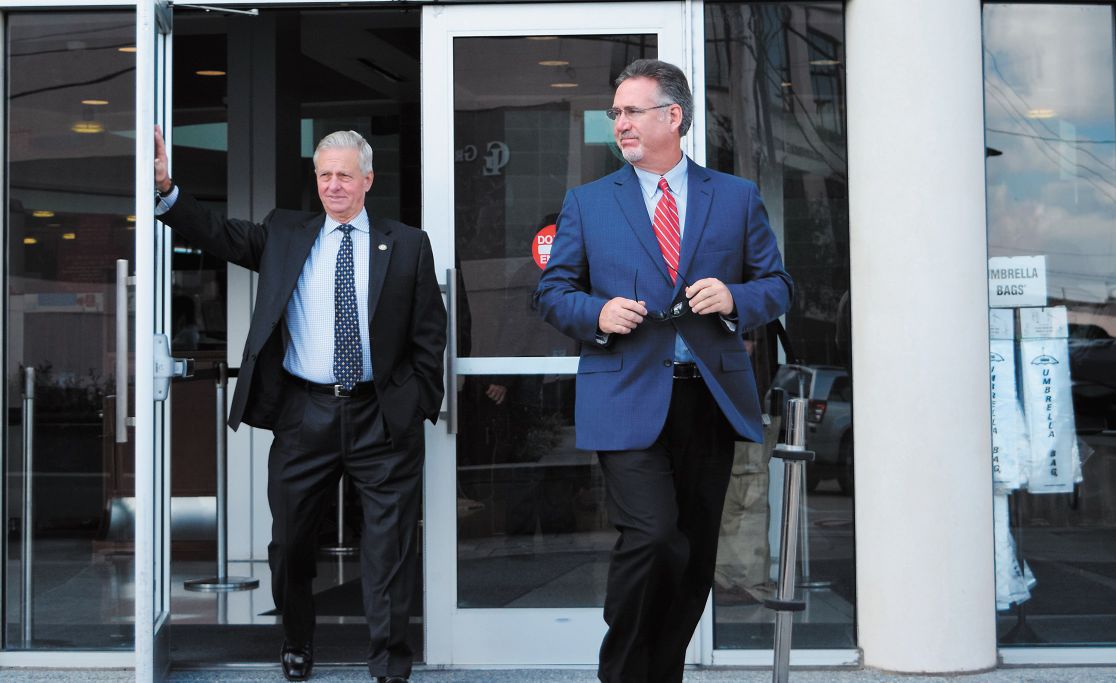
Night Out unites neighbors in crime fight
September 30, 2015
HPD pay raises in proposed budget
September 30, 2015When HTV owner Martin Folse went to court in Gretna last week he brought a high-profile entourage.
Terrebonne Parish Sheriff Jerry Larpenter, District Attorney Joe Waitz Jr. and State Rep. Joe Harrison showed up for a hearing Thursday related to the suit brought against the Houma television station by the owner of a convenience store.
And his lawyer made sure the judge knew it.
“My client is here and I also want to say there are some distinguished officials,” attorney Mary Ellen Roy said, listing Larpenter, Waitz and Harrison.
Legal scholars and local attorneys maintain that the announcement of VIP presence was, at best, “unusual.”
The suit alleges that Folse defamed the Roadrunner convenience store at St. Charles Street and La. Highway 311, and a clerk who worked there, on a segment of his Bayou Time television show.
The segment aired previously broadcast video footage of raids by Larpenter’s drug agents on convenience stores accused of selling artificial marijuana, as well as accusations by Folse – based on information from law enforcement officers – that some convenience stores in Terrebonne Parish with Middle Eastern owners send money to nations with terrorist ties.
During the same broadcast Folse related claims of insults to veterans by a clerk at the Roadrunner store, as told by a Houma neurosurgeon, Dr. Phillip McAllister.
Folse denies the defamation allegation, maintaining that the controversial Nov. 9 broadcast’s content explored matters of public interest protected by his right to free expression.
SLAPP STATUTE
Judge Nancy Miller is expected to decide this week whether the suit, brought by Trio Leasing, owner of the store, and Nepalese national Saghar Simkhada, the clerk, should be dismissed under a special provision of Louisiana law.
The so-called “anti-SLAPP” statute allows early dismissal of a lawsuit if the judge finds the action arose from any act of the defendant “in furtherance of the person’s right of petition or free speech under the United States or Louisiana Constitution in connection with a public issue … unless the court determines that the plaintiff has established a probability of success on the claim.”
SLAPP stands for “strategic lawsuit against public participation” and describes suits allegedly brought to chill free speech.
During the broadcast Folse related allegations by McAllister, an Army veteran, that Simkhada called him a “f— a—“ and then referred to all veterans using the same phrase.
The dispute, both sides agree, emerged during an argument over a charge by McAllister that Simkhada sold him the wrong cut of chewing tobacco.
During his show Folse, who stated that he was told Simkhada was a Middle Eastern male,” showed video of raids on Houma-area convenience stores where synthetic marijuana was sold along with B-roll of the Roadrunner store, which is not alleged to have been involved with any of the trafficking.
During the show, Folse repeated statements made by law enforcement officers to him that many of the area’s convenience stores send money to the Middle East to fund terrorist operations.
DOCTOR DISMISSED
Attorneys for the Roadrunner litigants maintain in court papers that the result was a suggestion that the store was among them. The store was damaged, the suit alleges, by a boycott that was discussed on the program as well as ill will related to a protest by veterans and their supporters which resulted in a day-long shutdown of the store.
McAllister was also sued, and his attorney said fees and court costs should be assessed against the store and Simkhada because all the doctor did was relate his experience to Folse as protected speech.
The claims against McAllister had already been dropped.
During a vigorous argument on Folse’s behalf, media attorney Mary Ellen Roy said the convenience store incident “was an issue of public interest in and of itself,” as one of the elements required for the judge to decide that the anti-SLAPP issue applies and that the case should be dismissed.
“The context is the treatment of veterans, how a veteran is treated when he goes into a business establishment,” Roy said. “If you look at the context and the form of the statements that just corroborates it as a matter of public interest … There are a lot of issues being discussed in the community about the sale of synthetic marijuana and money going to fund terrorism.”
Referencing a transcript of the show provided to the court, Roy argued that Folse never specifically said on the show that the Roadrunner store was selling synthetic marijuana or that it was involved with terrorist activities.
“Even if you assume (for the sake of argument) that Mr. Folse did say that money from this store was going to support terrorism, the burden is on the plaintiff to prove falsity and malice,” Roy said, stating that the plaintiffs will be unable to prove falsehood or specific malice.
SUPPORT FOR FOLSE
The attorney for the store and the clerk, Paul Carriere, accused Folse of “bootstrapping public issue such as terrorizing … and synthetic marijuana into this lawsuit.”
The dispute between Simkhada and McAllister, Carriere said, was a private matter.
“The comments have to be made in connection with a public matter,” Carriere said, for the anti-SLAPP arguments to apply.
He also said statements Folse made regarding his clients “are false.”
Roy countered that Facebook discussions about the incident prior to the Folse broadcast had already made it a topic of public interest.
The public officials who attended the hearing said they did so in support of Folse and his long-standing support of efforts to derail sales of synthetic marijuana in Terrebonne Parish and other localities.
They said they did not know that their presence would be announced to the judge, but that they had good reason for being there, and made clear that they fiercely support Folse’s defense against the defamation claims.
“I introduced vital legislation regarding synthetic marijuana and things going on with a lot of convenience stores,” said Harrison. “Martin was informing the public of some of the dangers of things that are out there today.”
Larpenter said he came to support Folse.
“What I heard (on the broadcast) was not accusations by Martin that this convenience store was funneling money, it was the accusations by Dr. McAllister regarding the argument. I was there to support Martin. He has been reporting accurate information that I know of. He has an opinion whether people agree with it or not is his opinion and I stand up for freedom of speech in this country and I stand up for veterans. If someone was criticizing you I would be there for you as well.”
Larpenter was also critical of statements presented by Carriere suggesting the argument between McAllister and Simkhada was spurred by a lack of understanding of the English language by the clerk.
“I think you have a clerk who came in there and was new,” Larpenter said. “If he
can’t speak the language, what is he doing in an American store where he has got to know every item in the store that somebody is going to purchase?”
Waitz said his purpose in attending was to support Folse as well.
“As you know, Martin and I have been friends for a long time,” Waitz said, expressing a desire to learn more about synthetic marijuana distribution by listening to arguments that might have been presented.
LA PROFS WEIGH IN
While not critical of the public officials for attending the hearing, local attorneys and law professors expressed surprise upon learning that Roy announced their presence to the judge.
Dr. Paul Baier of the Louisiana State University School of Law, when asked if such practices were prevalent in the state’s courts, answered in the negative and said it amounted to the elected officials being used as “props.”
“As far as I am concerned you don’t bring props like that to try to weigh the scales of justice in your favor,” said Dr. Paul Baier of Louisiana State University School of Law. “It is very unusual to present props in a courtroom trying obviously to persuade a judge.”
Another LSU law professor, Jeff Brooks, director of Advocacy and Professional Practice, also described the move as “unusual.”
“It is something that would only be done in a case that is fairly high profile,” Brooks
said. “It is a way of saying ‘look who is interested in this, look at how important this case is … we got all these people to come.’ It is a very particular tactical choice that would only be used on a rare occasion.”
If the intent was to impress Judge Miller, attorneys who have practiced before her in the past said, the effort was likely wasted.
“She would not be impressed,” one attorney said.
Questioned about her decision to announce the officials in court, Roy said she did so as a courtesy to the court.
Miller said she expects to issue a ruling sometime this week.














